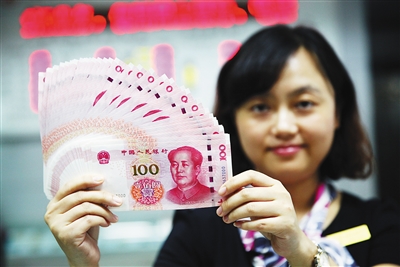


China is exploring the creation of a mechanism that would use a band to guide the country's interest rates, an approach aimed at giving the market a greater say in the financial system, a senior monetary official said on Sunday.
Yi Gang, vice-governor of the People's Bank of China, said at a news conference that the mechanism being looked at is an interest rate corridor that would be formed through the central bank's deposit and lending facilities to commercial banks.
"China needs to improve the interest rate system to enhance the guidance of the market rates and the effectiveness of monetary policy," said Yi, who is also a member of the Chinese People's Political Consultative Conference National Committee. He made the remarks on the sidelines of the ongoing meetings of the country's political advisers and lawmakers.
Yi said the PBOC would continue to use open-market operations as well as lending and deposit facilities with commercial banks to guide short-term interest rates.
The exploration of adopting an interest-rate corridor underscored China's efforts to further liberalize interest rates and support the slowing economy though more effective monetary policy.
In the past, the monetary authority managed interest rates by setting up floors and ceilings. China has already scrapped the caps on both loan and deposit interest rates.
But Yi said that China is currently in the initial stages of establishing an interest-rate corridor because the PBOC has to take into account both the qualitative and quantitative targets of its monetary policy.
Regarding the value of the renminbi, Yi said that the Chinese currency will remain stable against a basket of currencies and there is no basis for continued depreciation.
Separately on Sunday, PBOC Governor Zhou Xiaochuan said China's monetary policy will support the country's ongoing supply-side reform with a focus on the reduction of industrial overcapacity.
"Monetary policy is mainly to manage aggregate demand. If it is done appropriately, it will give more room for supply-side policies," Zhou told reporters while attending the meeting of the National People's Congress, the country's top legislature.
"China has adopted targeted monetary policy and encouraged different financial structures, which can better serve the reform policies to address the issues of overcapacity reduction, deleveraging and inventory destocking," he said.
 China has world's largest high-speed rail network
China has world's largest high-speed rail network Top beauties in Chinese provinces
Top beauties in Chinese provinces 600 people attend Lusheng playing contest in S China
600 people attend Lusheng playing contest in S China Engineer troop builds bridge in real combat conditions
Engineer troop builds bridge in real combat conditions You can urinate in public in Chongqing
You can urinate in public in Chongqing Rice terrace scenery in southwest China's Yunnan
Rice terrace scenery in southwest China's Yunnan 2016 Miss Chinatown USA pageant held in San Francisco
2016 Miss Chinatown USA pageant held in San Francisco Ancient pagodas across China
Ancient pagodas across China Wedding dress show up in the air
Wedding dress show up in the air Top 20 hottest women in the world in 2014
Top 20 hottest women in the world in 2014 Top 10 hardest languages to learn
Top 10 hardest languages to learn 10 Chinese female stars with most beautiful faces
10 Chinese female stars with most beautiful faces China’s Top 10 Unique Bridges, Highways and Roads
China’s Top 10 Unique Bridges, Highways and Roads Harris is making waves in S.China Sea
Harris is making waves in S.China Sea With new plant, Airbus seeks to secure China market share
With new plant, Airbus seeks to secure China market share Chinese sound off on America’s loudest presidential hopeful
Chinese sound off on America’s loudest presidential hopeful 40 years after Cultural Revolution, repentance of Red Guards is still rare
40 years after Cultural Revolution, repentance of Red Guards is still rareDay|Week